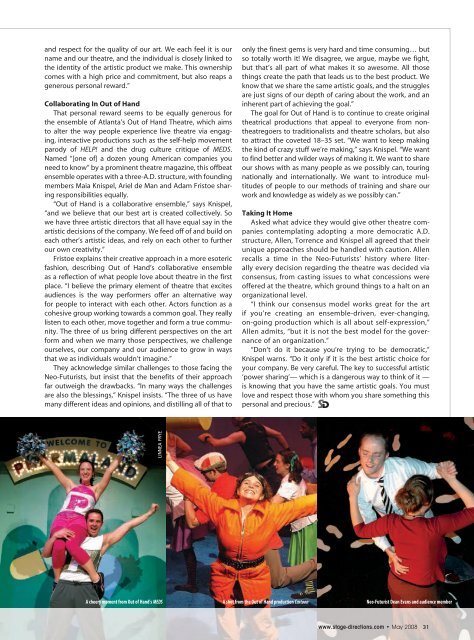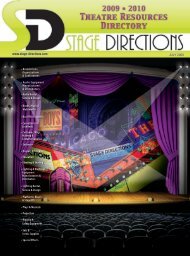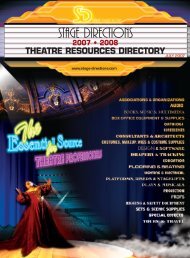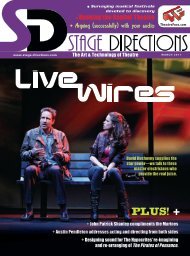Download a PDF - Stage Directions Magazine
Download a PDF - Stage Directions Magazine
Download a PDF - Stage Directions Magazine
You also want an ePaper? Increase the reach of your titles
YUMPU automatically turns print PDFs into web optimized ePapers that Google loves.
and respect for the quality of our art. We each feel it is our<br />
name and our theatre, and the individual is closely linked to<br />
the identity of the artistic product we make. This ownership<br />
comes with a high price and commitment, but also reaps a<br />
generous personal reward.”<br />
Collaborating In Out of Hand<br />
That personal reward seems to be equally generous for<br />
the ensemble of Atlanta’s Out of Hand Theatre, which aims<br />
to alter the way people experience live theatre via engaging,<br />
interactive productions such as the self-help movement<br />
parody of HELP! and the drug culture critique of MEDS.<br />
Named “[one of] a dozen young American companies you<br />
need to know” by a prominent theatre magazine, this offbeat<br />
ensemble operates with a three-A.D. structure, with founding<br />
members Maia Knispel, Ariel de Man and Adam Fristoe sharing<br />
responsibilities equally.<br />
“Out of Hand is a collaborative ensemble,” says Knispel,<br />
“and we believe that our best art is created collectively. So<br />
we have three artistic directors that all have equal say in the<br />
artistic decisions of the company. We feed off of and build on<br />
each other’s artistic ideas, and rely on each other to further<br />
our own creativity.”<br />
Fristoe explains their creative approach in a more esoteric<br />
fashion, describing Out of Hand’s collaborative ensemble<br />
as a reflection of what people love about theatre in the first<br />
place. “I believe the primary element of theatre that excites<br />
audiences is the way performers offer an alternative way<br />
for people to interact with each other. Actors function as a<br />
cohesive group working towards a common goal. They really<br />
listen to each other, move together and form a true community.<br />
The three of us bring different perspectives on the art<br />
form and when we marry those perspectives, we challenge<br />
ourselves, our company and our audience to grow in ways<br />
that we as individuals wouldn’t imagine.”<br />
They acknowledge similar challenges to those facing the<br />
Neo-Futurists, but insist that the benefits of their approach<br />
far outweigh the drawbacks. “In many ways the challenges<br />
are also the blessings,” Knispel insists. “The three of us have<br />
many different ideas and opinions, and distilling all of that to<br />
only the finest gems is very hard and time consuming… but<br />
so totally worth it! We disagree, we argue, maybe we fight,<br />
but that’s all part of what makes it so awesome. All those<br />
things create the path that leads us to the best product. We<br />
know that we share the same artistic goals, and the struggles<br />
are just signs of our depth of caring about the work, and an<br />
inherent part of achieving the goal.”<br />
The goal for Out of Hand is to continue to create original<br />
theatrical productions that appeal to everyone from nontheatregoers<br />
to traditionalists and theatre scholars, but also<br />
to attract the coveted 18–35 set. “We want to keep making<br />
the kind of crazy stuff we’re making,” says Knispel. “We want<br />
to find better and wilder ways of making it. We want to share<br />
our shows with as many people as we possibly can, touring<br />
nationally and internationally. We want to introduce multitudes<br />
of people to our methods of training and share our<br />
work and knowledge as widely as we possibly can.”<br />
Taking It Home<br />
Asked what advice they would give other theatre companies<br />
contemplating adopting a more democratic A.D.<br />
structure, Allen, Torrence and Knispel all agreed that their<br />
unique approaches should be handled with caution. Allen<br />
recalls a time in the Neo-Futurists’ history where literally<br />
every decision regarding the theatre was decided via<br />
consensus, from casting issues to what concessions were<br />
offered at the theatre, which ground things to a halt on an<br />
organizational level.<br />
“I think our consensus model works great for the art<br />
if you’re creating an ensemble-driven, ever-changing,<br />
on-going production which is all about self-expression,”<br />
Allen admits, “but it is not the best model for the governance<br />
of an organization.”<br />
“Don’t do it because you’re trying to be democratic,”<br />
Knispel warns. “Do it only if it is the best artistic choice for<br />
your company. Be very careful. The key to successful artistic<br />
‘power sharing’— which is a dangerous way to think of it —<br />
is knowing that you have the same artistic goals. You must<br />
love and respect those with whom you share something this<br />
personal and precious.”<br />
Linnea Frye<br />
A cheery moment from Out of Hand’s MEDS A shot from the Out of Hand production Cartoon Neo-Futurist Dean Evans and audience member<br />
www.stage-directions.com • May 2008 31
















